Chicago’s Black Community Feels Left Behind During the Migrant Crisis
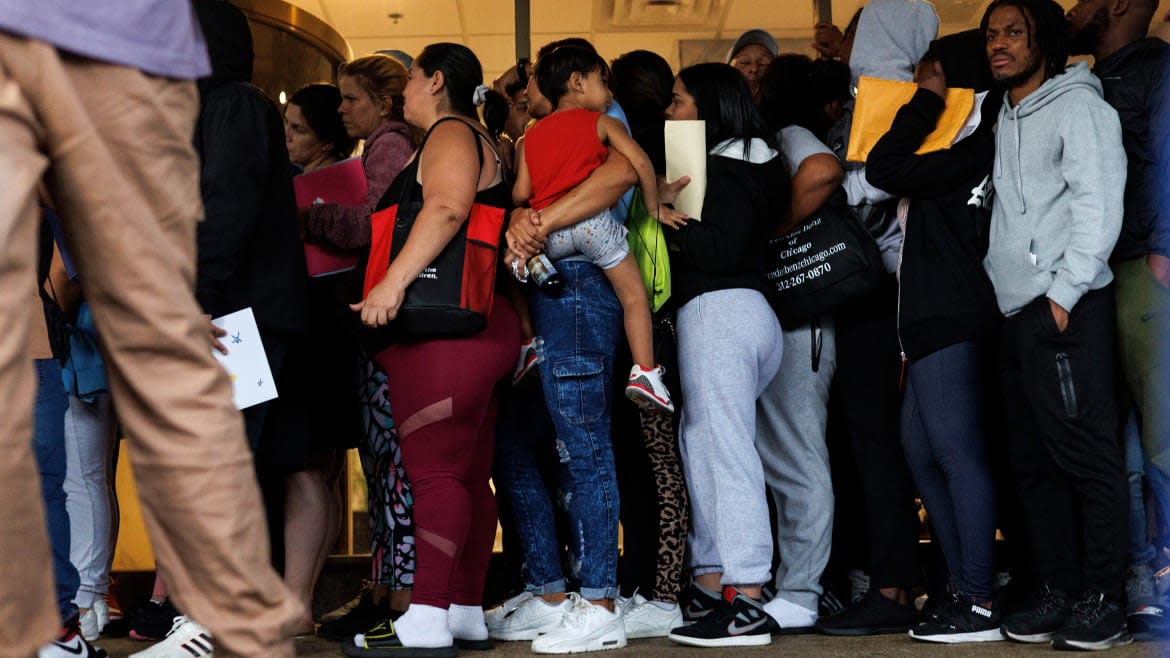
The migrant crisis has become a top issue in cities thousands of miles away from the southern border. My hometown of Chicago, the host city for the 2024 Democratic National Convention, is no exception.
Illinois Gov. J.B. Pritzker (D) is preparing for up to 25 buses filled with migrants each day. Meanwhile, activists, community leaders, residents, and aldermen are urging a halt to the influx.
Liberal, humanitarian values—including providing safe harbor for those in need, and supporting children and families regardless of their nation of origin—are running into direct conflict with the scarcity of funds available.
Tucker Carlson and Megyn Kelly Remain Obsessed With the Obamas
Some of this conflict is by design, as it was when Texas Gov. Greg Abbott (R) started busing migrants to Chicago as part of a conservative strategy to overwhelm Democratic run cities, especially those with sanctuary status. Encouraging Democratic infighting with regards to addressing the migrant crisis is part of a larger conservative agenda, migrants are the pawns.
But it didn’t make Democratic leaders balk, at least at first.
Former Chicago Mayor Lori Lightfoot in 2022 called the strategy “racist and xenophobic.” Meanwhile, the city and the state pledged support for new arrivals. Gov. Pritzker said, “My great grandfather came to this country as an immigrant fleeing Ukraine in 1881. Immigrants, just like my family, seeking freedom and opportunity built this country. Illinois is and has always been a welcoming state.”
But that was then and this is now.
Maze Jackson, principal of the Intelligence Group, a consulting agency based in Chicago focused on elevating “What’s In It For the Black People” says, “The city and state are in conflict because of those same economic realities. The state passed a budget that did not account for all the costs associated with migrants, and shifted the responsibility to the city when the administration changed. It’s an in-state battle for resources that should be provided by the federal government.”
According to Monday’s edition of Capitol Fax, an online publication focused on Illinois state-level politics, a Pritzker administration official bemoaned, “The growing asylum seeker crisis is like COVID without the money.”
That’s a pretty stark reality and considering the thousands of migrants Chicago is absorbing, neither the city nor the state can go it alone. With an additional 200-270 migrants per day, the shelter costs alone are draining the city’s coffers.
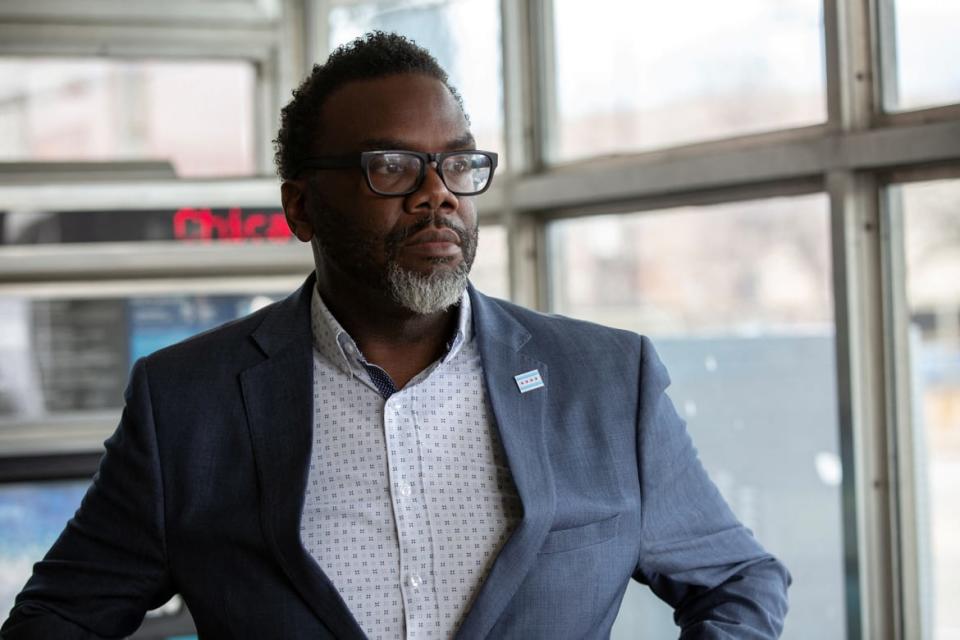
Mayor Brandon Johnson in Chicago, Illinois.
On one hand, the city of Chicago and the state of Illinois are committed to welcoming immigrants, migrants, and refugees, but on the other hand, the city has never experienced an influx at this level, leaving it at a loss with how to serve the newcomers. Democratic leaders are also flummoxed on how to address community angst—specifically from the Black community that has historically been underserved and suffered from community divestment.
Chicago Mayor Brandon Johnson’s point of view is that the city not only bears responsibility for the migrants, but also has an obligation to uphold the city’s stated humanitarian ideals.
Mayor Johnson told The Daily Beast, “There are some in our country who want a rematch of the Civil War, and who dwell in divisiveness, but I refuse to let them divide our great city. Chicago will welcome new arrivals, as well as secure resources and investments for longtime Chicagoans in all communities. We will not flinch in protecting our people, or the principles on which we live.”
What Liberals Don’t Want to Admit About Influxes of Migrants
Like New York City and the state of New York, Chicago and the state of Illinois are also requesting assistance from the federal government.
In a letter to President Biden released on Monday, Gov. Pritzker called the current migrant situation “untenable” and pointedly targeted the Biden administration for “lack of intervention and coordination at the border.” With over 15,000 migrants and counting reaching Illinois in the past year alone, Pritzker wants federal support to sustain what the state of Illinois and the city of Chicago have done in providing for safe harbor and supportive services for the growing population.
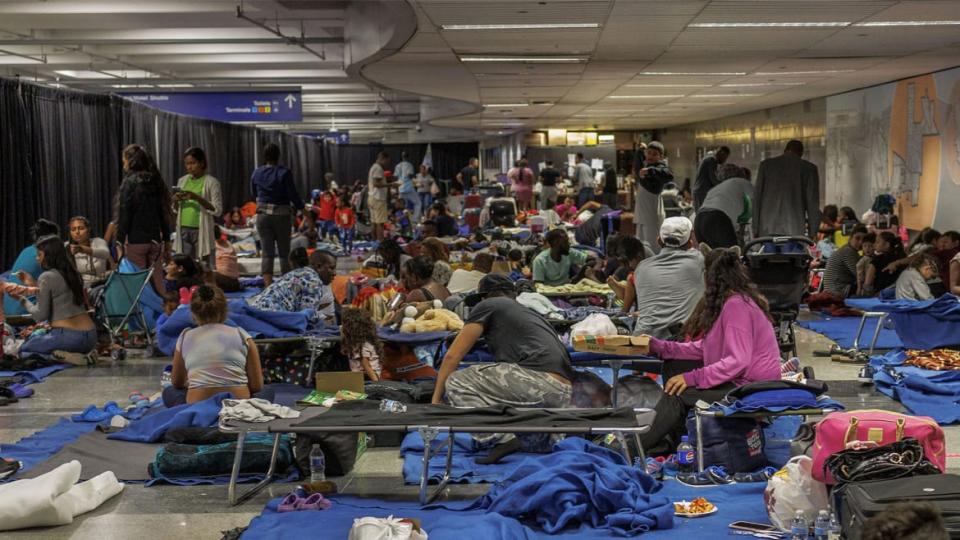
Recently arrived migrants in a makeshift shelter operated by the city of Chicago at O'Hare International Airport on Aug. 31, 2023.
But city and state leaders are facing backlash from Chicago’s Black community—which includes many people who feel their needs are being pushed to the backburner in favor of concerns on how to handle the migrant influx.
According to CBS News Chicago, at a recent community forum on the West Side held by Alderman Chris Taliaferro, one concerned resident said, “We’re not anti-migrants, but it should not be on our backs.” There were calls to vote out the elected officials who are seen as treating the migrant crisis with more urgency and support than the issues facing Chicago’s longtime Black residents.
Xavier Ramey, a community organizer and founder and CEO of Justice Informed, a social impact organization focused on equity and DEI, said, “For African Americans, the most famous and most watched minority group, how we engage in economic and social solidarity is modeled across the world. Black Chicago has every right to feel that this is a slap in the face. Not because of busloads of migrants, but because of multigenerational divestment and underinvestment, and the private philanthropic communities not doing their fair share.”
The GOP Wants You to Be Terrified of a Black Woman President
He has a point, but there have been town halls, debates at community centers, and testy commentary about resource allocation, Black underemployment, lack of affordable housing, and economic development across Black Chicago long before the first migrant-filled bus reached the city.
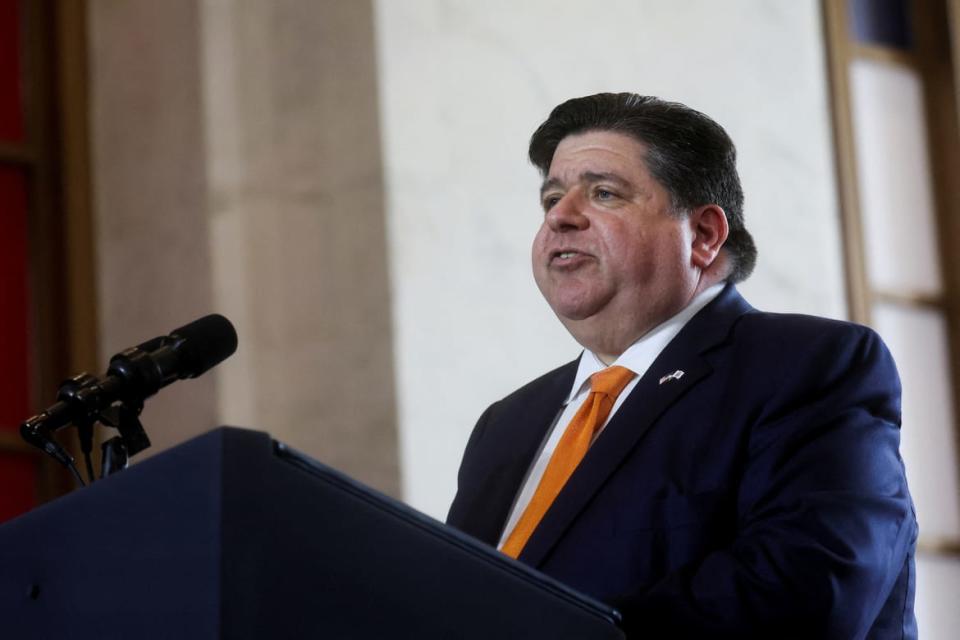
Illinois Gov. J.B. Pritzker speaks at The Old Post Office in Chicago, Illinois, on June 28, 2023.
But the backlash is real. South Shore residents pushed back against converting a high school into a migrant shelter. According to Maze Jackson, “The migrant crisis is driving greater divide between the Black community, which has been the base for the Democratic Party, and widely views the resources being directed to migrants are being redirected from their own communities that have been systemically divested for years.”
The migrant crisis, however, isn’t just affecting the South and West sides of the city (predominantly Black areas). The city’s largest migrant shelter is located at 162 East Ohio St., prime real estate on the Gold Coast in Chicago’s vibrant downtown. Alderman Brian Hopkins, whose ward includes the shelter, wants to close it, citing complaints from residents about a diminishing quality of life , narcotic sales, prostitution panhandling, and other issues.
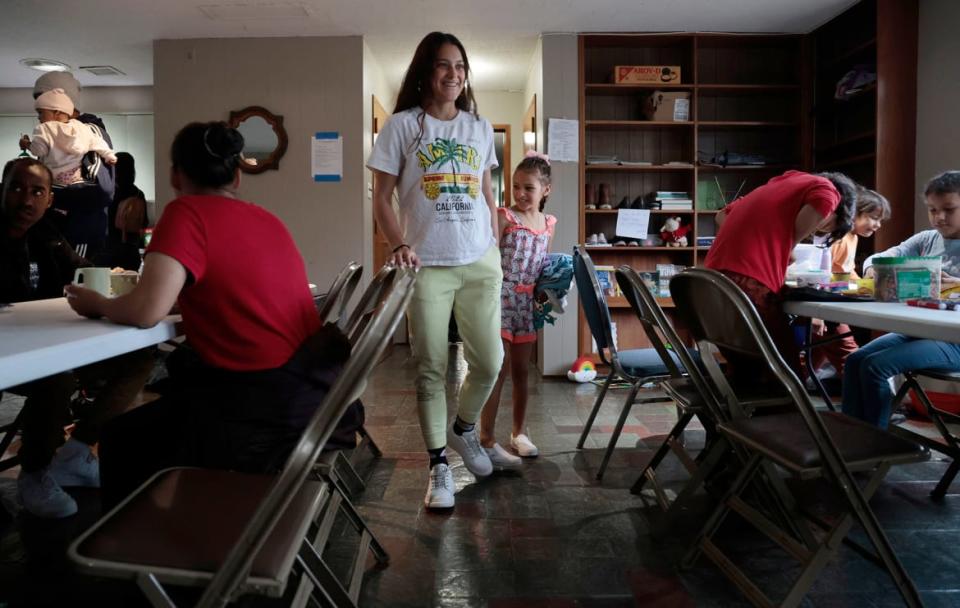
Maria Osorio and daughter Camila, migrants from Venezuela, arrive for a shower on Oct. 5, 2023, at St. Catherine of Siena-St. Lucy Catholic Church in Oak Park, Illinois.
It’s obviously not an easy crisis to resolve, nor is the conflict between the needs Black residents and incoming migrants a manufactured one. But no one city or state can solve America’s migrant crisis, or its mess of an immigration system.
Immigration reform is a federal policy issue that requires federal intervention, but with a Congress in chaos, little can be expected from Capitol Hill. That means it’s up to the Biden administration, private sector, and philanthropic communities to address this crisis.
There has to be a balance. Chicago and Illinois are walking a tightrope. Any missteps could have not only grave political consequences, but also economic devastation.
Why Americans Can’t Agree on How to Handle the Migrant Crisis
Jackson summed it up nicely, “Because Illinois and Chicago have decided to be sanctuar[ies], we have a responsibility to the migrants, but it is driving a wedge between political leaders and voters.”
Chicago is the “city of broad shoulders,” proud of its toughness and resilience. But will the migrant crisis prove itself too heavy a burden to bear?
There are many political and moral reasons for the Biden administration to finally step up and take the lead on managing this national crisis whose effects are primarily seen at the local level. But for optics alone, a Democratic White House can’t possibly expect it to be a good look hosting its quadrennial nominating convention in August 2024—in Chicago—as the city tears itself apart trying to meet the needs of its citizens and visitors.
President Biden, this is your job.
Get the Daily Beast's biggest scoops and scandals delivered right to your inbox. Sign up now.
Stay informed and gain unlimited access to the Daily Beast's unmatched reporting. Subscribe now.

